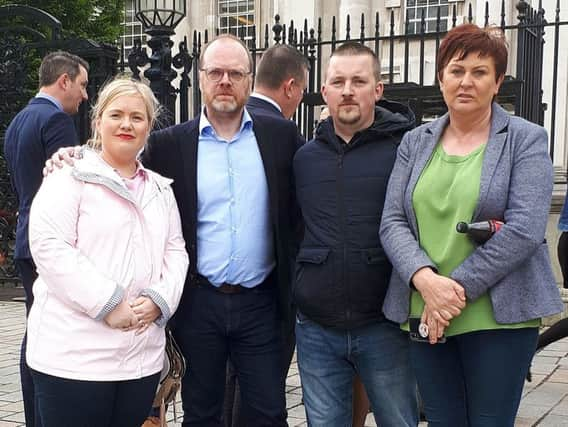Loughinisland documentary: Judges quash search warrants against filmmakers


Senior judges held that authorisation for the searches which led to the arrest of Trevor Birney and Barry McCaffrey had been inappropriate.
A further hearing this week will determine whether documents seized in the operation should be returned.
Advertisement
Hide AdAdvertisement
Hide AdThe outcome represents a victory for Mr Birney and Mr McCaffrey in their challenge to the legality of warrants granted as part of an investigation into the alleged theft of confidential documents from the Northern Ireland Police Ombudsman’s Office.
Following a two-day hearing Lord Chief Justice Sir Declan Morgan confirmed: “We are minded to quash the warrants on the basis that they were inappropriate, whatever the other arguments.
“We are going to list the case at 2pm on Friday for a discussion on the question of remedy.”
The case is connected to the murders of six Catholic men at Loughinisland, Co Down in June 1994.
Advertisement
Hide AdAdvertisement
Hide AdUVF gunmen opened fire in a village pub as their victims watched a World Cup football match.
The award-winning investigative journalists were involved in the documentary film No Stone Unturned, which examined the RUC’s handling of the Loughinisland atrocity.
In August last year they were detained, questioned and released during an operation undertaken by detectives from Durham Constabulary, supported by PSNI officers.
Judicial review proceedings were brought in a bid to have the warrants declared unlawful.
Advertisement
Hide AdAdvertisement
Hide AdAll of the seized material remains under seal, with police having given an undertaking not to examine any of the documents and computer equipment pending the outcome of the legal action.
Outside court Mr Birney claimed that following the release of No Stone Unturned police focused on the journalists, instead of those responsible for the murders at Loughinisland.
“That speaks volumes about where priorities lay for the senior ranks of the PSNI,” he said.
“Why did they make the focus of their investigations two journalists, rather than using their resources to go after the killers and trying to bring justice to the Loughinisland families almost 25 years later?”
Advertisement
Hide AdAdvertisement
Hide AdDescribing the police operation as an attempt to “send a chill factor through journalists investigating the past in Northern Ireland”, Mr Birney insisted all material seized must now be returned.
He added: “They should hand back the millions of documents, computers, laptops and also the mobile phones belonging to my children that they took from my home.”
During the hearing lawyers for the two journalists had contended that the search operation was aimed at discovering sources and intimidating whistleblowers.
Judges were told the raids were an “outrage” more akin to a police state than a liberal democracy.
Advertisement
Hide AdAdvertisement
Hide AdIt was stressed that police were made aware the film was being made, with the intention of naming suspects whose identities have been in the public domain for more than two decades.
With no attempt made to seek a court injunction to stop the documentary, suspects were also notified and offered an opportunity to respond.
On day two of the case counsel for the police forces under challenge argued that the warrants were sought amid concerns the material would be destroyed.
Peter Coll QC told the court detectives were focused only on probing potential offences linked to a leak from the ombudsman’s office.
Advertisement
Hide AdAdvertisement
Hide Ad“It doesn’t translate into an opportunity to attack investigative journalism or an opportunity to try and inhibit and stymie and stifle freedom of expression,” the barrister said.
“The purpose of the investigation is to deal with the criminality that arises from disclosure of these documents.”
But in reply, Barry Macdonald QC, for Mr Birney, set out details of an alleged reaction from Durham Police to his client meeting a cross section of MPs at the Houses of Parliament.
The court heard claims that a “foul and abusive” phone call was made to the offices of Grahame Morris, MP for Easington, Co Durham, from someone purporting to be a senior officer in the constabulary who “ranted about his meeting with ‘terrorists and criminals’”.
Mr Macdonald submitted: “That is obviously completely out of order, but it’s reflective of a police officer in charge of this investigation who is, at the very least, over zealous.”